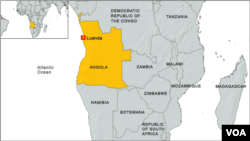Angola’s government is tightening the noose around free expression, according to a top Angolan journalist and an international rights watchdog.
Angolan journalist Rafael Marques de Morais was last arrested in 2013. The veteran reporter was covering a court case for his anti-corruption website, Maka Angola, and trying to interview two of the defendants outside the courthouse in Luanda. He describes that harrowing experience.
“What was striking was not the stomping on the back I received directly from the commander of this special police unit. It was not the severe blow with a baton to the back of my neck. It was not even the fact that the police filmed us being abused at the headquarters of this infamous unit for the pleasure of their superiors. What was striking to me was the ability of the judicial system to execute such a robbery of justice,” he said.
Since his first arrest in 1999 as a newspaper reporter, Marques has flirted with danger in a nation that rights groups say is getting increasingly repressive.
Human rights focus
His critics say he has sown dissent and defamed the government by alleging corruption and calling the nation’s leader of 35 years a “dictator” -- a charge for which he was tried, sentenced to six months in prison and ordered to pay damages directly to the president.
At Maka Angola, he continues to focus on what he says are two of the most important stories in his Southern African nation: corruption and human rights abuses.
Still in the hot seat, he told hundreds of academics, journalists and students who came to hear him speak at Johannesburg’s University of the Witwatersrand.
“As I speak to you, I am awaiting at any time, to face nine separate trials in Angola, for supposedly having offended seven Angolan generals and two diamond companies. Upon describing more than 100 cases of torture and murder committed by personnel employed by them in their private security companies and diamond ventures, I concluded that they are the moral authors of crimes against humanity,” he said.
Marques said some of the generals are seeking more than a million dollars in damages over his reports on human rights abuses.
Pattern of repression
The Committee to Protect Journalists has documented numerous instances of arrest, intimidation and killings of journalists in Angola. Since 1992, the year Marques joined the state-owned Jornal de Angola, 10 journalists have been killed on the job, and the CPJ classifies seven of those deaths as murder.
VOA News’ parent organization, the Broadcasting Board of Governors, says four VOA journalists have been targeted by authorities since 2006.
In 2011, a contract reporter for VOA’s Portuguese to Africa service was convicted of libel and defamation and sentenced to a year in prison for reporting allegations of improper conduct by a judge.
Another VOA reporter was targeted when a man telephoned the Portuguese Service asking for the reporter’s whereabouts and threatening to “take care” of him.
New York-based Human Rights Watch (HRW) also has documented increasing repression in Angola.
HRW Southern Africa director, Tiseke Kasambala, said the government has not just stifled the press, but also anyone who protests against the government in any form. She cited an October 11 arrest of more than a dozen young protesters who were beaten, held without charge, and denied medical care and access to lawyers.
“What we’ve seen is an intensification in the number of peaceful protests in Angola, as a result of poor governance issues and the poor economic situation and the gross inequalities that exist in the country," said Kasambala. "The government has clamped down very heavily on these people.”
Continuing threats
Angolan authorities have said in public forums -- most recently at a United Nations review of its human rights record -- that the government respects free speech and allows protests.
And, Marques said, the government has used him as part of their argument. “Members of the regime are not shy about saying in public that the fact that I am alive, and still doing my work, is evidence of democracy in Angola and the magnanimity of the president.”
In 2000, a member of parliament said during an open debate that if Marques kept criticizing the president, he “would not live to the age of 40.”
He’s now four years past that deadline, living in Luanda -- and he said he has no intention of stopping.




